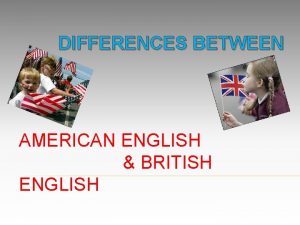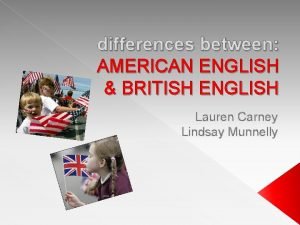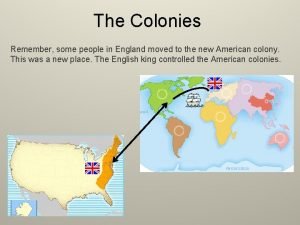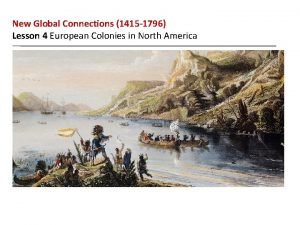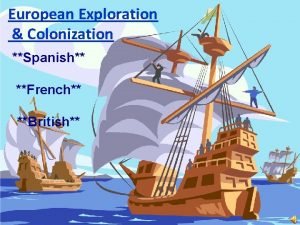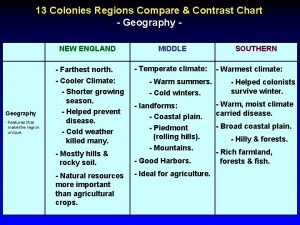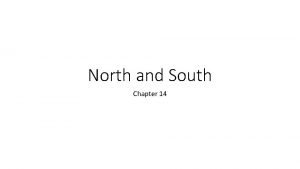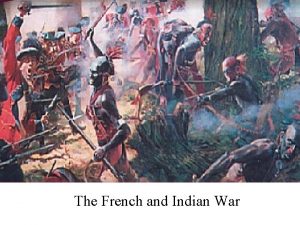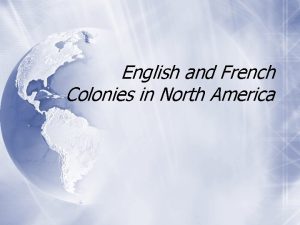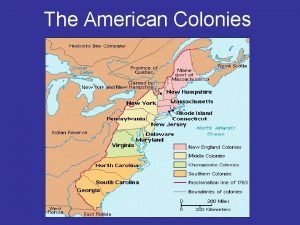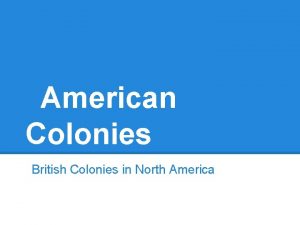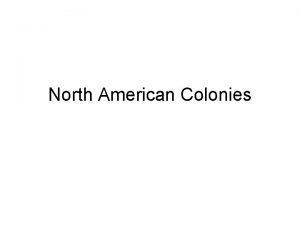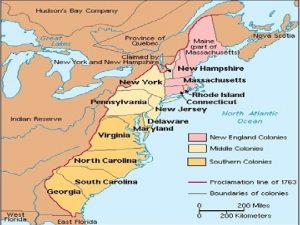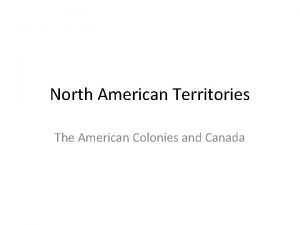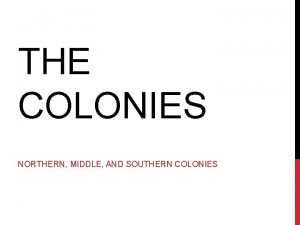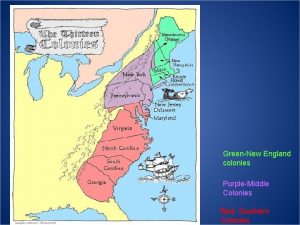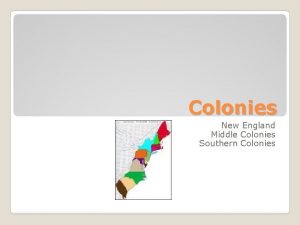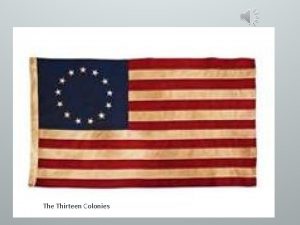III English French Colonies A North American Colonies

















- Slides: 17

III. English & French Colonies

A. North American Colonies 1. labor question biggest concern 2. initially solved with indentured labor (white Europeans) 3. 80% of immigrants to Virginia & Maryland came on 7 year labor contracts for passage, land, tools, clothes 4. French colonists looking for mineral wealth (gold), while British seeking “N. W. passage” to Indies


B. New France 1. voyages of Jacques Cartier (1524 -42) 2. hopes of mineral wealth (‘fools gold’) 3. first settlement: St. Lawrence River establishing Quebec 1608 (by 1673 only 7, 000 French) 4. ‘wealth’ found in Amerindian’s furs

French-Native American Conflict 1. no conquest but access to trade pushed wars with Amerindian tribes 2. France allied with Huron & Algonquin tribes against Iroquois Confederacy – supplied arms, armor, & men

Fur Trade in New France French in Canada depended on fur trade. Traders depended on participation of Amerindian trappers and traders, knowledge of canoe building, and assistance with transport along difficult river systems and over harsh terrain.

French in Louisiana 1. French expanded west and south: Louisiana (1699) 2. based on fur trade (deer) 3. Seven Years’ War (1756 -63), or French-Indian War, fought mostly in N. America over British expansion; considered 1 st “world” war 4. England took Quebec (1759) 5. Treaty of Paris gave Canada & Florida to the English & Louisiana to Spain

Geography of the Seven Years’ War

Before and After the Seven Years War Between France and Britain


B. British in North America 1. Early experiments: – Sir Humphrey Gilbert (1580 s): Newfoundland – Sir Walter Raleigh (1585): Roanoke Island, N. Carolina – Roanoke resettled 1587 -- no one survived – English also ‘colonized’ Ireland (1566)

British Settlers Arrive in North America

Jamestown Colony: 1. London investors organized ‘The Virginia Company’: sent settlers to Jamestown 1606, 1609 2. 80% died within 15 years (disease & Amerindian attacks) 3. 1624 company dissolved 4. settlers dispersed along Chesapeake Bay: furs, timber, tobacco 5. use of white indentured servants for labor

‘The South’ 1. settlers from Virginia moved into n. Carolina: --economy based on tobacco & timber --s. Carolina settled by British planters from the Caribbean (1670) --new capital Charlestown attracted diverse immigrants --economy tied to West Indies

C. The Dutch in ‘New Netherland’ 1. Dutch West India Company bought Manhattan Isle from Amerindians & established a colony (1624) 2. Established alliances with Iroquois (enemies of French in Canada) to access fur trade 3. 1664 surrendered to British, taken over by Duke of York: New Netherlands became New York 4. New York economy: Atlantic shipping 5. attracted Germans, Dutch, Swedish settlers

D. The British in New England 1. 1600 -1630 ‘New England’ settled by: – Pilgrims at Plymouth; strict religious community & absorbed into larger Massachusetts Bay Colony in 1691 – Puritans founded joint stock Massachusetts Bay Company (migrants arrived with whole families) – more urban (Boston), more “American”, & economy based on commercial shipping & financial services

E. Pennsylvania 1. William Penn granted colony as refuge for Quakers (1682) 2. Successful economy based on trade 3. Philadelphia attracted German immigrants & freed & slave blacks
 Colonial states
Colonial states Hamlet act iii scene ii
Hamlet act iii scene ii An american highway and a british
An american highway and a british American english
American english British english and american english
British english and american english Name the southern colonies
Name the southern colonies European colonies in north america
European colonies in north america New exploration
New exploration Compare and contrast graph
Compare and contrast graph The american colonies emerge
The american colonies emerge True north vs magnetic north
True north vs magnetic north Cumbria and north east ics
Cumbria and north east ics North and south lesson 3 southern cotton kingdom
North and south lesson 3 southern cotton kingdom The north pole ____ a latitude of 90 degrees north
The north pole ____ a latitude of 90 degrees north Prewar boundaries 1754
Prewar boundaries 1754 English level iii
English level iii Aunt flossie's hats
Aunt flossie's hats Air mass source regions
Air mass source regions


